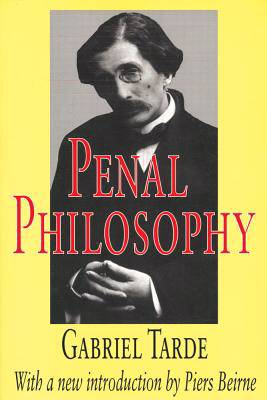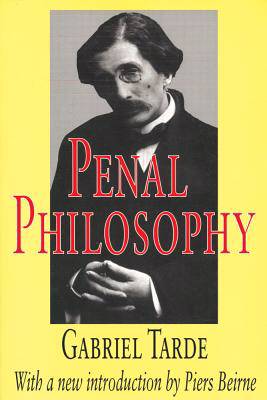
Je cadeautjes zeker op tijd in huis hebben voor de feestdagen? Kom langs in onze winkels en vind het perfecte geschenk!
- Afhalen na 1 uur in een winkel met voorraad
- Gratis thuislevering in België vanaf € 30
- Ruim aanbod met 7 miljoen producten
Je cadeautjes zeker op tijd in huis hebben voor de feestdagen? Kom langs in onze winkels en vind het perfecte geschenk!
- Afhalen na 1 uur in een winkel met voorraad
- Gratis thuislevering in België vanaf € 30
- Ruim aanbod met 7 miljoen producten
Zoeken
€ 62,95
+ 125 punten
Omschrijving
During his lifetime and for decades after, the writings of the French magistrate and scholar Gabriel Tarde exercised considerable influence in Europe, and the United States, extending to such diverse fields as social theory, political philosophy, and psychology. Yet Tarde's intellectual accomplishments also merit honorable status in the history of criminology, where the focus of his labors was the attempt to forge a compromise between classical jurisprudence and positivism. Tarde creatively applied a general system of social psychological theory to crime and penality. He led the struggle against Lombrosian criminal anthropology and against the scientism of Franco-Belgian moral statisticians. He also participated in well-publicized and occasionally quite acrimonious debates with ?mile Durkheim about the supposed normality of crime. His ideas are difficult to grasp. The reader of Penal Philosophy may discover in any of its nine chapters a diversity of subjects attacked with different modes of reasoning supported by contradictory discursive techniques. Tarde's literary style is frequently convoluted, although sometimes quite elegant. It is often irritatingly polemical and even obscure. Nevertheless, within this volume one can discern that the several strands of Tarde's criminology are in fact complementary approaches to a common goal, namely, the procurement of an acceptable "neo-classical" basis for criminal responsibility and punishment. Tarde constructs a sociological explanation of crime in which the individual is ultimately the principal actor, and suggests forms of penalty whose principles avoided the determinist implications of positivism. In these ways, Tarde's Penal Philosophy helped to forge the dominant features of neoclassical jurisprudence. This book will be of keen interest to students of criminology, jurisprudence, and sociology.
Specificaties
Betrokkenen
- Auteur(s):
- Uitgeverij:
Inhoud
- Aantal bladzijden:
- 581
- Taal:
- Engels
- Reeks:
Eigenschappen
- Productcode (EAN):
- 9780765807052
- Verschijningsdatum:
- 2/01/2001
- Uitvoering:
- Paperback
- Formaat:
- Trade paperback (VS)
- Afmetingen:
- 151 mm x 227 mm
- Gewicht:
- 820 g

Alleen bij Standaard Boekhandel
+ 125 punten op je klantenkaart van Standaard Boekhandel
Beoordelingen
We publiceren alleen reviews die voldoen aan de voorwaarden voor reviews. Bekijk onze voorwaarden voor reviews.









